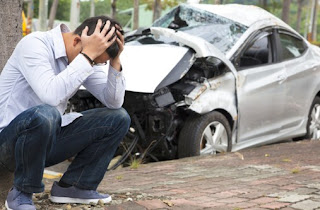How to Prove a Car Accident Liability Case
Who is at risk after an auto crash?
Auto collisions can occur for some reasons. The essential components of an auto or truck mishap are like any carelessness guarantee. To demonstrate some person acted in a careless way causing recoverable harms, (for example, in a car crash), you should demonstrate:
A Duty
Rupture of the obligation (carelessness)
Causation between the obligation and
Harms coming about because of the break of the obligation.
To demonstrate that some individual was careless (break of an obligation), it must be demonstrated that the respondent fizzled utilize customary care - that which a sensible individual of standard reasonability would have done under the same or comparable conditions. We are on the whole under an obligation to utilize "conventional care" in working a vehicle or truck. In individual damage assert including an auto or truck mishap, carelessness is for the most part what causes generally mischances. A few sorts of careless conduct which can cause an auto collision and individual damage include:
Inability to keep an appropriate post
Inability to control their speed, for example, speeding or driving too gradually.
Following too firmly behind another driver
Neglecting to yield right-of-way
Experiencing a red light or neglecting to stop at a stop sign
Inability to control the vehicle
Inability to utilize the brakes in the auto
Neglecting to utilize the horn
Neglecting to utilize a turn flag effectively
Driving in a weakened state, for example, affected by liquor or medications
Driving on the wrong side of the street
This isn't a comprehensive rundown as there can be numerous different ways that the auto or truck driver can act carelessly and cause wounds. Moreover, in numerous pile up cases, the careless driver has neglected to utilize standard care in various ways.
To demonstrate that the careless activities of the other auto or truck driver is at risk, you should demonstrate that they were the "proximate reason" of your wounds. " Proximate reason" implies that reason which, in a characteristic and constant grouping, delivers an occasion, and without which cause such occasion would not have happened. Keeping in mind the end goal to be a proximate reason, the demonstration or oversight grumbled of must be with the end goal that a man utilizing normal care would have predicted that the occasion, or some comparative occasion, may sensibly result in this manner. There might be in excess of one proximate reason for an occasion. In an auto crash case, proximate reason is once in a while an issue in an auto or truck mishap case.
When carelessness (obligation, rupture of the obligation) and causation are built up, it is important to assess the harms that can be recouped by some individual harmed in a car crash. The most widely recognized kinds of harms looked for and recoverable in a pile up individual damage case in Texas are:
Past and future physical agony and mental anguish
Past and future distortion
Past and future physical debilitation
Loss of consortium
Loss of family unit administrations
Loss of past wages
Loss of future procuring limit
Past therapeutic costs
Future therapeutic costs
Corrective (Exemplary) harms in specific cases
Auto wrecks can be the consequence of driver distractedness, extreme speed, diversions and weakness. Auto collisions that are the consequence of driver weakness are very normal. The impedance can be caused by numerous elements including medication and liquor mishandle.
Sometimes, a claim for individual wounds from an auto collision may likewise be brought against people other than the careless driver. On the off chance that the driver was working for an organization or individual, at that point the business might be in charge of the driver's carelessness and the subsequent harms. Moreover, regardless of whether not working, the proprietor of the vehicle might be obligated for the carelessness of the driver. This is known as risk for careless entrustment. Under this reason for activity, a proprietor of a vehicle that enables another to work it can be held at risk for his or her careless driving. The proprietor - whether companion, associate, parent, sibling, sister, life partner or other relative - might be at risk on the off chance that they carelessly endowed the vehicle to some individual they knew, or ought to have know, to be a heedless, bumbling or unlicensed driver.




Comments
Post a Comment